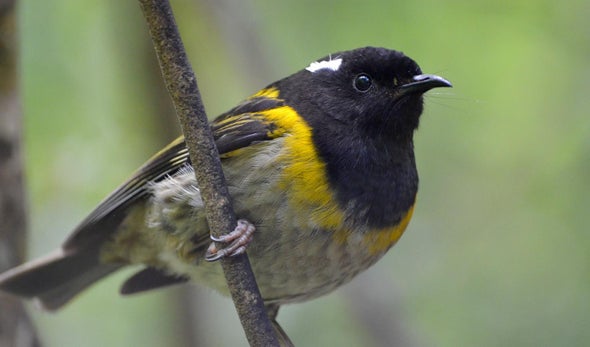(单词翻译:单击)
听力文本
This is Scientific American — 60-Second Science. I'm Christopher Intagliata.
For more than a hundred years, this sound has been missing from New Zealand's forests: (hihi call up and under) "It's like two stones being clicked together, or two marbles being clicked together. It's a very simple call." Oliver Metcalf, a conservation biologist at Manchester Metropolitan University, has studied the small bird that makes the noise—the hihi. By the 1880s, it was all but wiped out by rats and disease, which came along with colonists.
But the hihi did manage to survive on a predator-free barrier island called Te Hauturu-o-Toi. And now they're being reintroduced to mainland New Zealand. "And they're going through the process of trying to restore the ecosystems they had prior to colonial settlement there. So they're bringing back the birds one by one."
But the dense forests, and the birds' unusual behavior, makes them tough to monitor. "They're very inquisitive—they love people! So they'll come and see you. If they hear you coming, they'll come and see you. But that means you have a problem of knowing what they would have been doing when you're not there."

So instead, Metcalf and his collaborators from the Zoological Society of London used that distinctive call (hihi call) to their advantage—using an array of audio recorders to eavesdrop on 40 hihi birds reintroduced to the North Island's Rotokare Scenic Reserve. A month later, analysis of the calls revealed that the birds had abandoned some areas of the reserve, and settled into others... suggesting they'd begun to form territories, often close to water.
The details are in the journal Methods in Ecology and Evolution.
Metcalf says the concept could be used to monitor all sorts of animals. "So whether that's a reintroduction of a small mammal, or how existing birds species respond to a housing development nearby or something like that, this process could be used to understand how those populations respond to changes."
Assuming, that is, they make some noise.
Thanks for listening for Scientific American — 60-Second Science. I'm Christopher Intagliata.
参考译文
这里是科学美国人——60秒科学。我是克里斯托弗·因塔利亚塔。
这种声音已经在新西兰的森林中消失了100多年:(hihi鸟的声音)“这就像两块石头碰在一起,或是两块大理石撞在一起。这是非常简单的声音。”曼彻斯特城市大学的保护生物学家奥利弗·梅特卡夫研究了制造这种噪音的小鸟——hihi鸟。到19世纪80年代,这些鸟几乎被随移民而来的老鼠和疾病彻底消灭。
但是hihi鸟的确成功地在没有捕食者的Te Hauturu-o-Toi堰洲岛上生存了下来。现在它们将被重新引入新西兰大陆。“他们正在努力恢复成为殖民地之前的生态系统状态。因此,他们一个接一个地将鸟带回来。”
但是茂密的森林和这些鸟不同寻常的行为使它们很难监控。“它们非常好奇——它们喜欢人类!所以它们会过来看你。如果它们听到你来了,它们就会来看你。但这意味着一个问题,你不知道你不在的时候它们会做什么。”
因此,梅特卡夫及其来自伦敦动物学会的合作者利用这一独特的声音(hihi鸟的声音)——用大量录音机来窃听重新引入新西兰北岛Rotokare风景保护区的40只hihi鸟。一个月后,对这些声音的分析显示,这些鸟已经放弃了保护区的一些区域,并在其他地方定居下来,这表明它们开始建立领地,通常是靠近水域的地区。
详细信息发表在《生态学与进化方法》期刊上。
梅特卡夫表示,这个概念可以用来监测各种动物。“因此,无论是重新引入小型哺乳动物,还是现有鸟类物种对附近住房开发做出何种反应,或诸如此类的事情,这一过程都可以用来了解这些种群如何应对变化。”
假设它们会制造一些嗓音。
谢谢大家收听科学美国人——60秒科学。我是克里斯托弗·因塔利亚塔。
译文为可可英语翻译,未经授权请勿转载!
重点讲解
重点讲解:
1. all but 几乎;差不多;
The concrete wall that used to divide this city has now all but gone.
曾经将这座城市分隔开的混凝土墙现在已几乎不复存在。
2. wipe out 摧毁;毁灭;使灭绝;
The spill could wipe out the Gulf's turtle population.
这次原油泄漏可能会使波斯湾的海龟灭绝。
3. use sth. to one's advantage (尤指转变不利情况使之)对…有利;
We are all drawn to negative things, and companies should be able to use this to their advantage.
我们都关注负面的东西;公司应该能利用这一点为自己服务。
4. eavesdrop on 偷听;窃听;
The size of the data and the computing power needed mean hackers likely won't be able to eavesdrop on conversations at will, analysts say.
分析人士说,数据的规模和所需的计算能力意味着黑客们很可能无法随意窃听手机通话。


